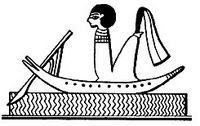In her blog post,
"Poetry as Spiritual Practice: Work in Progress", Sheila Packa writes, "Poems are spirit/objects. They are made of sound and breath and truly good poems seem to have life — they bring us an experience, a body experience, and spirit or light." She follows this discussion of poetry as subject/object, with its characteristics of flow/resistence, ambiguity/certainty, and in her final section about vision/revision, she quotes Thomas Moore's
Original Self: Living with Paradox and Originality (2000):
"The soul has its own set of rules, which are not the same as those of life ... the events of the soul are cyclic and repetitive. Familiar themes come round and round. The past is more important than the future. The living and the dead have equal roles. Emotions and the sense of meaning are paramount. Pleasures are deep, and pain can reach the very foundations of our existence."
Packa follows this quote with Ranier Maria Rilke:
"I live my life in widening circles
that reach out across the world.
I may not complete this last one
but I give myself to it."
She concludes, "The four spiritual dynamics, spirit/object, resistance/flow, ambiguity/certainty, and vision/revision, can bring healing. Using these dynamics with your material — that which is given to you — helps you engage in an interaction or exchange. The last dynamic, vision/revision, provides an opportunity to reframe experience, to identify a cultural, historical and even mythic pattern."
Packa ends this post with a bibliography, a thoughtful guide for readers' further explorations.
Labels: Original Self, Poetry, Spirituality, Thomas Moore


